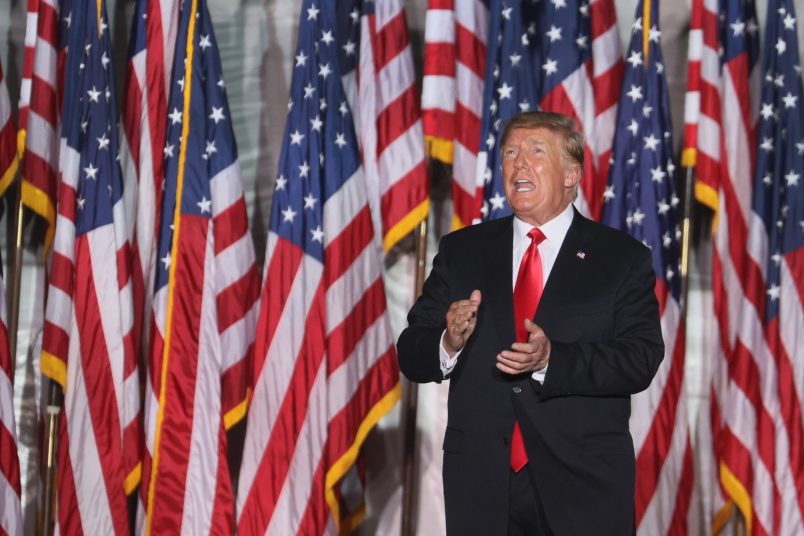Follow-on overnight reporting suggests that ex-President Trump canceled his January 6th celebration event because top lackeys and toadies lobbied him hard against it and he gave way. I doubt it was any fear of legal jeopardy – it’s hard to say Trump and his top supporters have ever pursued a legal strategy per se. They were just smart enough to see that the spectacle of Trump’s Mar-a-Lago celebration and cheering for freedom and vindication for the insurrectionists wouldn’t be helpful. It would put members of Congress in an awkward position. But the biggest insight was from TPM alum Benjy Sarlin, now of NBC News. As he put it, “I don’t think people quite get how far out his daily comments are already mainly because outlets are reluctant to publicize them.”
This is right on the mark. Booted off social media and mostly ignored in the mainstream press, Trump’s comments and positions have radicalized greatly over the course of 2021. In a sense it’s hard to say he’s “radicalized” in his increasingly explicit support for January 6th when after all, he led it in the first place. But Benjy’s right: most people don’t get how wild his regular comments are. His biggest supporters on Fox and Capitol Hill would prefer to keep it that way. Yes, Trump is still covered in the political news media. But you don’t generally hear directly what he’s saying.
This prompts a broader question. It’s become doctrine for many right-thinking people that people shouldn’t “amplify” what Trump is saying. That only does his work for him, we’re told. This is the logic that got him booted off social media. But if what Benjy says is right, this state of affairs, which has clearly driven Trump to distraction, has also proved almost the best of all possible worlds for him. Trump’s supporters hear his message loud and clear: through NewsMax, OANN, talk radio, Facebook and to a significant degree on Fox News. But for the rest of the political world it’s muffled. So the horror and craziness of Trumpism recedes from public consciousness while people are focused on the day to day imperfection of the Biden presidency.
This hasn’t made Trump any weaker. His hold over the institutional and electoral GOP has only intensified since leaving office. The very small number of elected officials who refused to support the Big Lie have mostly been drummed out of the party. Trump’s Big Lie propaganda has become unassailable in heavily state-legislative-gerrymandered states where it will matter most. In short, the “don’t amplify” doctrine has allowed Trump to speak freely to his supporters and intensify his hold over the GOP, while keeping the incendiary messages that mobilize a majority of the country against him largely off mainstream airwaves.
All of the upside and none of the down.
I concede there are other ways to look at the information before us. But I’m skeptical whether they’re more realistic ones. For years before Trump entered into national politics, we at TPM had a running argument with various people in the political news business or those who comment on it. Our theory was that the subterranean ‘Crazy’ of right wing politics was the real motive force and driver behind the GOP. The various Boehners and Ryans and Romneys and all the other mainstream personages who held press conferences on Capitol Hill were little more than a carapace of marginal respectability concealing the real driving power and direction of Republican politics. To see what the GOP was and where it was going that was where you needed to look.
To many though, attention to the Gohmerts and Jim Jordans and Steve Kings of the GOP was just a tawdry indulgence. It wasn’t real politics. I have always believed that the emergence of Trump vindicated our view. If you were focused on Marco Rubio or Paul Ryan or Kevin McCarthy, the emergence of Trump was unexpected and baffling. But if you were looking at this underlying GOP, it was entirely predictable. Indeed, Trump’s political genius was to see that the GOP’s mainstream, the notional leadership, had been such an insubstantial film that it could be tossed aside entirely by a leader like Trump. Whereas a weak and hobbled John Boehner could, in essence, run the GOP on behalf of the House Freedom Caucus, Trump decided you could toss the pretense entirely and run the party from the Freedom Caucus itself.
At it’s worst, this “don’t amplify” doctrine is part of a species of liberal myopia which posits that the American right only exists as an outgrowth or effect of decisions made by or within mainstream or progressive media. If it is not acknowledged, “amplified” if you will, it all but doesn’t exist. Or, if it does exist it is without enough substance or sustenance to avoid dying on the vine. This is all the most risible folly.
I’m not saying we should rush to get Trump back on Twitter or other social media or that networks should cover every speech live. Journalism is about making choices. Private companies are responsible for the speech they carry on their platforms. But most of “don’t amplify” doctrine is based on myopia, a feel-good if well-meaning misunderstanding of how both journalism and political power work.

 Members-Only Article
Members-Only Article




